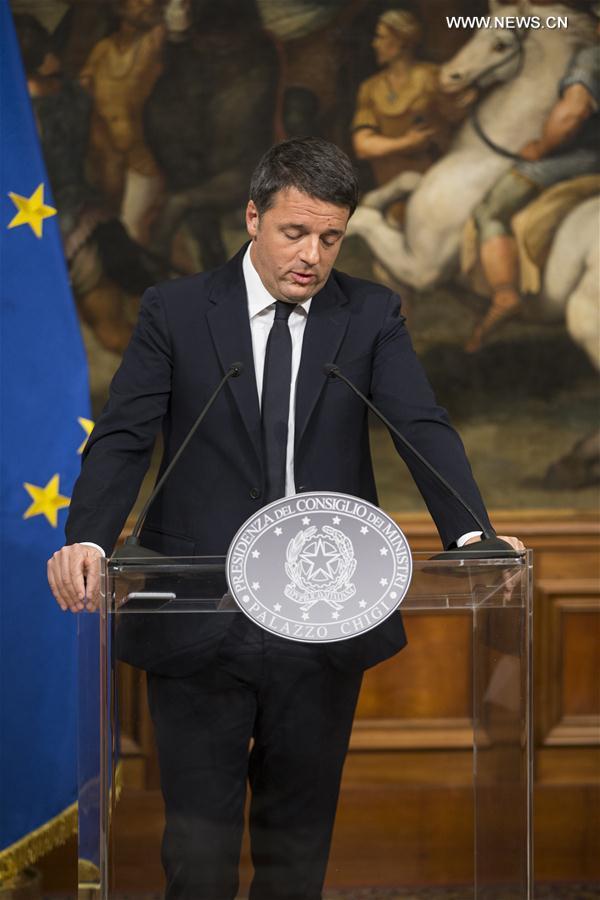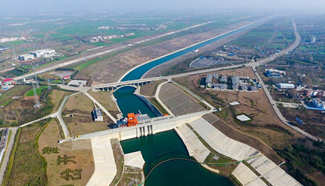
Italian Prime Minister Matteo Renzi speaks during a press conference in Rome Dec. 5, 2016. Matteo Renzi on early Monday announced resignation, as exit polls showed the Sunday referendum opposed constitutional reforms. (Xinhua/Jin Yu)
by Alessandra Cardone
ROME, Dec. 6 (Xinhua) -- The result of Italy's constitutional referendum held on Sunday is not meant to express anti-European feelings, or a popular will to leave the EU: as such, seeing it in the perspective of a possible "Italexit" -- as some media have called it -- would be improper, an Italian analyst said.
It is not truly similar to the Brexit referendum that marked Britons' decision to leave the European Union (EU), even less could it be likened to the victory of President-elect Donald Trump in the United States, Federico Niglia, professor of International History with the LUISS University in Rome, told Xinhua.
"The meaning of the Italian referendum is hardly comparable to that of the Brexit, or to the election of Donald Trump in the U.S.," he said.
The referendum on amending the Italian constitution marked a sound defeat for Prime Minister Matteo Renzi and his cabinet, which had backed the reform. Therefore, the prime minister on Monday handed in his resignation, which will become valid in a matter of a few days -- as soon as the 2017 draft budget is approved by parliament -- according to a specific request of Italian president Sergio Mattarella.
Meanwhile, many media and political analysts at global level started wondering whether this result should be read as a further signal of populism rise, and of discontent towards the EU overall.
According to the LUISS analyst, such interpretation was not fitting: Renzi's defeat would be due more to a personalization of politics, and of the referendum, promoted by the outgoing prime minister himself.
"Promoting a large program of reforms was the main source of legitimation for Renzi's cabinet", which was born in 2014 with the pledge of implementing a major economic and political overhaul of the country, Niglia explained. "The effects of the constitutional referendum have to be seen in such perspective."
The young Italian prime minister had long advocated the constitutional reform as "the mother of all battles", and indeed, if approved, it would have deeply reshaped the country's profile, the expert believes.
The major constitutional amendment would have demoted the senate, in terms of powers and size, leaving to the lower house only the full control over national legislation, and the power to bring down a cabinet with no-confidence votes.
Yet, the so-called "perfect bicameralism" -- that means having two houses with equal law-making status and powers -- is a deeply ingrained element of Italy's politics, having been in effect since the constitution's inception in 1948.
A 59 percent majority of voters rejected the reform on Sunday, and many of them did so because they felt uneasy at the idea of a stronger cabinet depending on the control of one branch of the parliament only.
Yet, the political crisis that will open as soon as Renzi steps down might plunge the eurozone's third largest economy into a new period of instability.
Would this deal another blow to the euro? The analyst believed it would rather not, because "the correlation between political crises and economic crises has changed."
"The market reaction to the Brexit, and to Trump's election, confirmed the absence of a direct correlation. The first market reactions to Renzi's resignation seem to go in the same direction," Niglia said.
Overall, what markets will probably look at with more attention will be Italy's mid-term capacity to maintain stability in its public finance, according to Niglia.
At the same time, despite a strong feeling against Renzi's cabinet have indeed played a crucial role in the referendum's defeat, the vote should not be compared to the Brexit.
"The event cannot even be compared to the Brexit: Italy is a founding member of the EU, and a pivotal force, along with France and Germany, in the process of European integration," Niglia stressed.
Finally, many foreign observers wondered if the fall of Renzi's center-left government might pave the way to a possible withdrawal of the country from the euro.
Such doubts rose from the fact that the "No" camp in the referendum included populist, anti-establishment Five Star Movement (M5S) and anti-immigration Northern League party.
Both forces were now capitalizing on the "No" victory, and hope to see their support increase in the next political election, which might come as soon as in spring 2017.
Although none of them have ever put Italy's membership in the EU into question, both have said they would like to call a referendum on the euro. Yet again, the analyst considered a potential withdrawal of Italy from the euro "very unlikely."
"It is true that a number of forces are campaigning against the EU," Niglia said. "Yet, it remains unclear whether these forces will ever become governmental forces."










